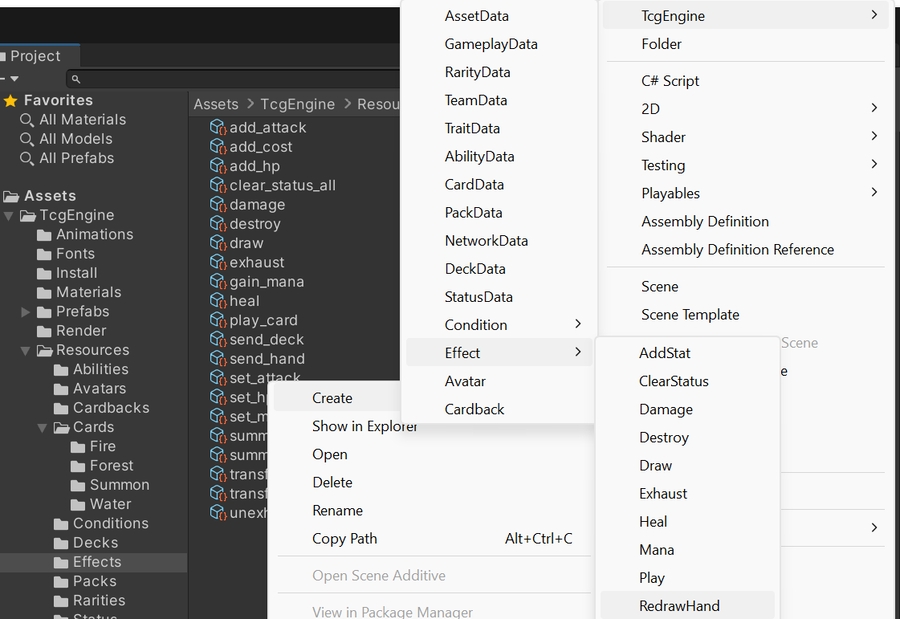Conditions and Effects
If you want to create new effects or conditions for your card abilities, you can create a new script that inherits from ConditionData or EffectData, and override one of the functions.
Effects
For example, let's create a new card ability effect to return all your cards into your deck, shuffle it, and then redraw the same number of cards. Create a new script called EffectRedrawHand.cs with:
using UnityEngine;
using TcgEngine;
using TcgEngine.Gameplay;
[CreateAssetMenu(fileName = "effect", menuName = "TcgEngine/Effect/RedrawHand", order = 10)]
public class EffectRedrawHand : EffectData
{
public override void DoEffect(BattleLogic logic, AbilityData ability, BattleCharacter character, Card card, BattleCharacter target)
{
int nb_cards = target.cards_hand.Count; //Store number of cards in hand
target.cards_deck.AddRange(target.cards_hand); //Add hand cards to your deck
target.cards_hand.Clear(); //Empty hand array
logic.ShuffleDeck(target.cards_deck); //Shuffle Deck
logic.DrawCard(target, nb_cards ); //Redraw Hand
}
}Notice in the definition of the function, the target is a BattleCharacter, this means we will need to select a character target (like CharacterSelf or AllCharacters) when creating the ability.
Conditions
Now lets say we want the player to only use this ability if they have at least 3 cards in hand. We can create a condition for it. Create a new script called ConditionHandCount.cs
Data Files
We will now create the data files for the effect we just created. And then Link it to the ability.
In Unity, right click inside a folder, and select Create -> TcgEngine -> Effects, select your new effect, it should be named what you set in the tag [CreateAssetMenu] in your new script.

Do the same thing with your new condition, and set the value to 3.

Now in Resources/Abilities, create a new ability, you can duplicate an existing one to make it faster with Ctrl-D
Set these settings on the ability

You can now add that ability to any card, this will give the card a new ability that when played, if you have 3 or more cards in hand, will shuffle back your hand into the deck and redraw the same number of cards.
Trigger Condition vs Target Condition
A trigger condition will be checked to know if the ability should trigger or not, while a target condition will be checked to see if a target is valid. If trigger conditions are true, the ability will be resolved (mana/action will be spent, fx will appear). The target condition is checked for each individual target after the ability was already triggered.
For example if you have an ability that you can cast when you have 5 HP or less and that affects ALL blue cards on the board, 5 HP would be a trigger condition, while "is blue" would be a target condition.
When creating a new script, use IsTriggerConditionMet for trigger conditions and use IsTargetConditionMet for target conditions. And place the condition in the appropriate array on the ability. Target conditions can be defined with 3 different types of targets: Card, Player or Slot.
Last updated